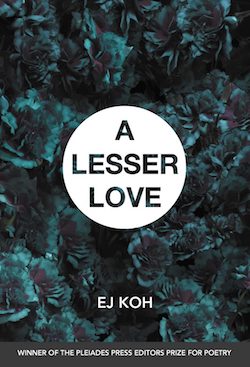Literary Event of the Week: A Lesser Love Launch Party
EJ Koh read her poem “South Korean Ferry Accident” to a room full of weary Bumbershoot attendees back in 2016. It’s a poem that begins with a bit of comedy: “Footage is released to the public: the captain/abandoning the ferry in his underwear.” Not only do we have an oafish captain forsaking the universal pledge to go down with the ship, but he’s jumping overboard in his underwear. It’s an image that brings pratfalls to mind, or a Benny Hill-style soundtrack.
But that image falls away to the real-life horror of one of the worst boating accidents in modern history. And Koh’s personal story becomes intertwined with the tragedy:
My parents are crying in the other room. “Why didn’t
the students jump into the water?
Americans would’ve jumped.”
It’s an immigrants’ dilemma: there’s something to be said for the traditions of one’s birth country, but when they become too constricting — when tradition overrules your chances of survival — it becomes necessary to flee to America. In America, traditions don’t kill you. If anything, too much freedom will kill you in America.
Last year, when Koh read the poem (“The footage is broadcast. The faces are blurred./The voices are changed. They are laughing”) the audience reacted almost as one. Eyes started watering. A few nasal snfffs tore through the audience, and then shoulders bobbed up and down. People were sobbing for these strangers that they’d never know who died in a ferry disaster, and who were being summoned by a Seattle poet for a Seattle audience at a quintessentially Seattle event. It was a tender moment, a special moment, the kind of event that everyone in attendance will likely always remember.
This is the genius of EJ Koh: her poetry combines tradition and freedom and history and hope and biography and tragedy in such a compelling way that audiences can’t help but be moved. Her voice is clear and warm; her eyes catch the little human moments that we often take for granted. Her poems are often slight — brief and simple — but they can clamber around your head like an elephant.

This Saturday, September 23rd, Koh will launch her debut collection, A Lesser Love, into the world at the Hugo House. She’ll read from the book, and then I’ll interview her onstage (I guess this is as good a place as any for a full disclosure: the Seattle Review of Books, has advocated early and often for Koh beginning on the day that we first published her jaw-droppingly good poem “Korean War” two years ago) and then she’ll take your questions.
In person, audiences are often surprised to see that Koh doesn’t seem as intense as her poems. She’s funny; she laughs a lot; she’s charming and humble. But the intensity is there, and it is real. With just a few words, carefully selected and arranged just so, she can bring a room full of humans to tears. She has that power